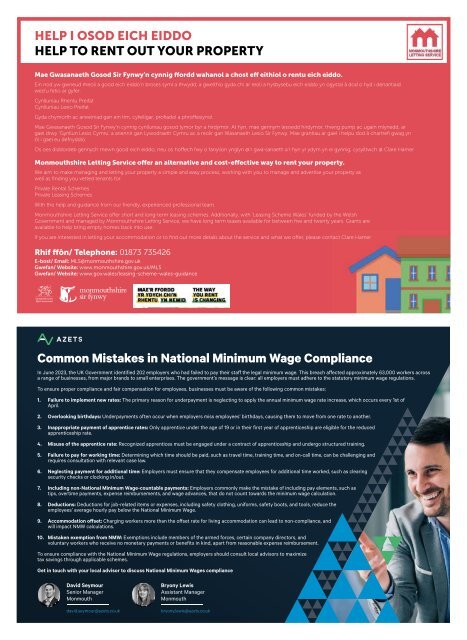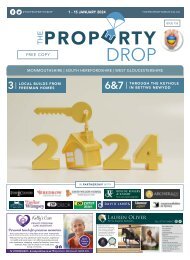Create successful ePaper yourself
Turn your PDF publications into a flip-book with our unique Google optimized e-Paper software.
HELP I OSOD EICH EIDDO<br />
HELP TO RENT OUT YOUR PROPERTY<br />
Mae Gwasanaeth Gosod Sir Fynwy’n cynnig ffordd wahanol a chost eff eithiol o rentu eich eiddo.<br />
Ein nod yw gwneud rheoli a good eich eiddo’n broses syml a rhwydd, a gweithio gyda chi ar reoli a hysbysebu eich eiddo yn ogystal â dod o hyd i denantiaid<br />
wed’u fetio ar gyfer:<br />
Cynlluniau Rhentu Preifat<br />
Cynlluniau Lesio Preifat<br />
Gyda chymorth ac arweiniad gan ein tim, cyfeillgar, profiadol a phroffesiynol.<br />
Mae Gwasanaeth Gosod Sir Fynwy’n cynnig cynlluniau gosod tymor byr a hirdymor. At hyn, mae gennym lesoedd hirdymor, thwng pump ac ugain mlynedd, ar<br />
gael drwy ‘Gynllun Lesio Cymru’ a ariennir gan Lywodraeth Cymru ac a reolir gan Wasanaeth Lesio Sir Fynwy. Mae grantiau ar gael i helpu dod â chartrefi gwag yn<br />
ôl i gael eu defnyddio.<br />
Os oes diddordeb gennych mewn good eich eiddo, neu os hoffech fwy o fanylion ynglyn @’r gwa-sanaeth a’r hyn yr ydym yn ei gynnig, cysylltwch @ Clare Hamer<br />
Monmouthshire Letting Service offer an alternative and cost-effective way to rent your property.<br />
We aim to make managing and letting your property a simple and easy process, working with you to manage and advertise your property as<br />
well as finding you vetted tenants for.<br />
Private Rental Schemes<br />
Private Leasing Schemes<br />
With the help and guidance from our friendly, experienced professional team.<br />
Monmouthshire Letting Service offer short and long-term leasing schemes. Additionally, with ‘Leasing Scheme Wales’ funded by the Welsh<br />
Government and managed by Monmouthshire Letting Service, we have long term leases available for between five and twenty years. Grants are<br />
available to help bring empty homes back into use.<br />
If you are interested in letting your accommodation or to find out more details about the service and what we offer, please contact Clare Hamer<br />
Rhif ffôn/ Telephone: 01873 735426<br />
E-bost/ Email: MLS@monmouthshire.gov.uk<br />
Gwefan/ Website: www.monmouthshire.gov.uk/MLS<br />
Gwefan/ Website: www.gov.wales/leasing-scheme-wales-guidance<br />
Common Mistakes in National Minimum Wage Compliance<br />
In June 2023, the UK Government identified 202 employers who had failed to pay their staff the legal minimum wage. This breach affected approximately 63,000 workers across<br />
a range of businesses, from major brands to small enterprises. The government’s message is clear: all employers must adhere to the statutory minimum wage regulations.<br />
To ensure proper compliance and fair compensation for employees, businesses must be aware of the following common mistakes:<br />
1. Failure to implement new rates: The primary reason for underpayment is neglecting to apply the annual minimum wage rate increase, which occurs every 1st of<br />
April.<br />
2. Overlooking birthdays: Underpayments often occur when employers miss employees’ birthdays, causing them to move from one rate to another.<br />
3. Inappropriate payment of apprentice rates: Only apprentice under the age of 19 or in their first year of apprenticeship are eligible for the reduced<br />
apprenticeship rate.<br />
4. Misuse of the apprentice rate: Recognized apprentices must be engaged under a contract of apprenticeship and undergo structured training.<br />
5. Failure to pay for working time: Determining which time should be paid, such as travel time, training time, and on-call time, can be challenging and<br />
requires consultation with relevant case law.<br />
6. Neglecting payment for additional time: Employers must ensure that they compensate employees for additional time worked, such as clearing<br />
security checks or clocking in/out.<br />
7. Including non-National Minimum Wage-countable payments: Employers commonly make the mistake of including pay elements, such as<br />
tips, overtime payments, expense reimbursements, and wage advances, that do not count towards the minimum wage calculation.<br />
8. Deductions: Deductions for job-related items or expenses, including safety clothing, uniforms, safety boots, and tools, reduce the<br />
employees’ average hourly pay below the National Minimum Wage.<br />
9. Accommodation offset: Charging workers more than the offset rate for living accommodation can lead to non-compliance, and<br />
will impact NMW calculations.<br />
10. Mistaken exemption from NMW: Exemptions include members of the armed forces, certain company directors, and<br />
voluntary workers who receive no monetary payments or benefits in kind, apart from reasonable expense reimbursement.<br />
To ensure compliance with the National Minimum Wage regulations, employers should consult local advisors to maximize<br />
tax savings through applicable schemes.<br />
Get in touch with your local advisor to discuss National Minimum Wages compliance<br />
David Seymour<br />
Senior Manager<br />
Monmouth<br />
david.seymour@azets.co.uk<br />
Bryony Lewis<br />
Assistant Manager<br />
Monmouth<br />
bryony.lewis@azets.co.uk


















